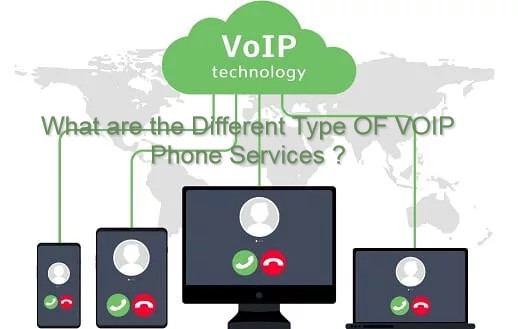Table of Contents
The usage of VOIP phones has increased a lot since they first came before years back. They are available in sizes of Big Iron substitute for the exchange PABX system for desktop-based VoIP software is small and the location of the place for the hosts. In the same way, the VoIP services offered have matured and grown in scope and application.
Almost all business and individuals understand that calls via VoIP are cheaper and more feature-rich than the old landline phone system. However, you may not be aware of VoIP services out there, not to mention selecting the right one for your requirement.
VoIP comes in many forms. Do you rarely leave home and office, or do you usually move? If you are an owner of a business, what is your company’s size, and what factors matter the most to you? Let’s look at some VoIP services available in the market to help you make better decisions when picking your way of voice communication,
Different types of VOIP Phone services?
Here we have shared with you the different types of VOIP phones available and the best usage of them-
Device-based VOIP Phones
It involves buying VoIP device providers and plugging it into the existing telephone sets so that you can make free calls in the USA. This means do not have to pay monthly bills, and you do not need any other device other than your old landline telephone set. Some of the best examples of this type of VoIP phone are MagicJack, Ooma, etc.
Mobile and Computer-Based VoIP Services
As a software-based VoIP service, VoIP phones are also applications. However, it is installed on the phone instead of a computer, allowing you to make and receive calls wherever you are as long as you have a good internet connection.
Of course, you do not need dedicated VoIP hardware to make and receive calls. Employees can make business calls using VoIP services from their business or personal smartphones, tablets, or even laptops. While smartphones have a dedicated speaker/microphone for audio calls, you may need a headset for desktops and laptops. The audio headset can be wired or wireless. Wireless headsets typically use Bluetooth to pair with specialized hardware to make and answer calls.
VoIP service vendors offer specialized applications on multiple mobile operating systems. Others set up their services to install any app of their choice to the phone system.
Residential VOIP Phones
This type of VoIP phone uses an adapter to connect the landline phone with a wifi modem, making and receiving the calls over the internet. The billing is done monthly based on the plan you select.
Business VoIP Services
VoIP for business comes in two options: local and cloud-based. Both provide communication solutions much more cost-effective than traditional landlines and have many essential features for business. The features include video and audio conference, interactive voice response, call queuing, interactive voice response, etc. These features are measurable, and you will also get complete technical support.
For the on-premise VoIP system, businesses need to buy all the equipment, and the house was in their office. The company has to pay a monthly fee for PRI circuits and SIP trunking, IT staff to improve and maintain the system regularly. The best part is you will have full control of your hardware.
Software-Based VOIP Phones
It is the most common type of VoIP, and many of us use it every day. You also access the online web-based application or install software on your computer. Then you use the audio input and output devices of your computer to talk and listen.
Conference Phones
We discussed this before the conference call. It is vital for any business that wants to have a meeting with a client. A conference call is similar to the usual VoIP. They allow communication between several people. You can add several party members to the call through what is often called the conference bridge.
USB And Softphones
Both phones are related to each other and hence, go hand in hand. A softphone is an application based on software rather than the actual phone. Once installed it into your computer system, you can make calls from there. You can even connect a USB phone to your computer via the USB jack. This way, you can communicate as you would with a regular phone.
Understanding these different VoIP phone services can help businesses determine the system that best suits their needs. SIP trunks, for example, is more appealing to those who want to install the technology on their own and manage their own, while still connected to the VoIP advantages. On the other hand, managed IP PBX is a good option for those who do not have the resources to purchase and operate their VoIP systems.
Hosted IP PBX solution frees businesses to choose hardware and software that works for them and frees them from the costs and administrative headaches maintain voice and data lines and associated operator partnerships.
In addition to the standard device, a wide range of accessories can be used to increase productivity and improve workflow. Some types of business VoIP hardware comes with an expansion module to enable certain features. For example, the administrative staff may need access to programmable function keys for these phone calls or manage senior executives’ behalf.















